
Related
Guests
- India Waltonsenior adviser for special projects for the Working Families Party, organizer with RootsAction and former Buffalo mayoral candidate.
In one of this year’s deadliest mass shootings, a white supremacist opened fire Saturday on a supermarket in a predominantly Black neighborhood in Buffalo, New York, killing 10 and wounding three others. Eleven of the victims are Black. The 18-year-old suspect posted racist ideology online before live-streaming his attack. We go to Buffalo to speak with India Walton, longtime community activist and former mayoral candidate, about the city’s systemic racism and segregation, which has led to “food apartheid.” Black residents in east Buffalo have just one grocery store, which the shooter targeted. “This is more than half a century of oppression, of systemic racism, and now is the time to renew the call for reparations,” Walton says.
Transcript
AMY GOODMAN: Residents of Buffalo, New York, gathered at vigils Sunday to mourn the 10 people killed on Saturday, when a white supremacist wearing body armor and carrying an assault rifle opened fire on a supermarket in a predominantly Black neighborhood. Of the 13 shoppers and store workers shot in the assault, 11 were Black. Buffalo resident Grady Lewis witnessed the shooting.
GRADY LEWIS: I was standing right across the street, and I heard a shot. And I knew it wasn’t a firecracker. And I looked up, and all I seen is smoke and a guy just shooting, shooting across, in the parking lot. And then I seen the security guard run inside the store. And when he ran inside the store, the other guy bent down and was just shooting inside the store. And I heard like at least 20 shots inside the store. And I didn’t have a phone on me, so I was just yelling and screaming for people to call the police. And I looked over. I seen a woman on the ground. I seen a man on the ground. I see another woman on the ground behind the gate.
AMY GOODMAN: Police are calling the massacre a domestic terror attack. They’ve arrested an 18-year-old suspect who reportedly live-streamed the massacre on the video streaming service Twitch. The site took the video down within minutes, but the footage continues to circulate among white supremacists online. The suspect left behind a racist manifesto that included a plan to target a mainly Black neighborhood. Investigators say he had researched the area and drove about 200 miles from his home in Conklin, New York, before arriving a day in advance to conduct reconnaissance. The manifesto heavily plagiarized a screed left behind by the white supremacist who killed 51 people at two mosques in Christchurch, New Zealand, in 2019. The manifesto refers to the “Great Replacement,” a racist conspiracy theory promoted by far-right media figures like Tucker Carlson of Fox News and embraced by some Republicans, including New York Congressmember Elise Stefanik.
Prosecutors say the shooter purchased the Bushmaster XM-15 semiautomatic rifle used in the assault lawfully from a licensed gun dealer in his hometown after he passed a background check. That’s despite the fact that the suspect previously threatened a mass shooting at his high school the year before. He allegedly modified the rifle to use high-capacity magazines that are banned in New York state.
President Biden spoke from the White House Sunday as Buffalo mourned the attack.
PRESIDENT JOE BIDEN: We’re still gathering the facts, but already the Justice Department has stated publicly that it is investigating the matter as a hate crime, racially motivated act of white supremacy and violent extremism. As they do, we must all work together to address the hate that remains a stain on the soul of America. Our hearts are heavy once again, but our resolve must never, ever waver.
AMY GOODMAN: The White House says President Biden will visit Buffalo Tuesday to meet with victims’ families. Journalist Madison Carter’s tweet eulogizing one of the victims, Pearly Young, went viral. Carter wrote, quote, “Pearly Young, 77, was killed today in #Buffalo shopping for groceries. For 25 years she ran a pantry where every Saturday she fed people in Central Park. Every. Saturday. She loved singing, dancing, & being with family. She was a mother, grandma, & missionary. Gone too soon.” The other named victims are former Buffalo Police Lieutenant Aaron Salter, who was an off-duty guard; also killed were Ruth Whitfield, Katherine “Kat” Massey, Heyward Patterson, Celestine Chaney, Roberta Drury, Geraldine Talley, Andre MacNeil and Marcus Morrison.
We now go to Buffalo, New York, where we’re joined by India Walton, former Buffalo mayoral candidate, longtime community activist, now a senior adviser for [special] projects for the Working Families Party and a senior strategic organizer with RootsAction.
India, welcome back to Democracy Now! Right now you’re just a few blocks from the grocery store where the shooting took place. Can you describe your response over the weekend and what’s happening in your community?
INDIA WALTON: There are a lot of heavy hearts in Buffalo right now. Details are still emerging, Amy. And as a matter of fact, I didn’t know that Kat Massey was one of the victims. I started my organizing career right here in the Fruit Belt, and Kat was a pillar of this community and a longtime supporter of mine and the work that I did, a woman who wrote a $10 check every month to support our community land trust. And these are some of the folks that we lost in this very horrific and tragic incident.
AMY GOODMAN: First of all, my condolences on this horror that has befallen your community, this act of domestic terrorism that has taken so many, including the mother — the oldest victim is the mother — right? — of the retired fire commissioner.
INDIA WALTON: Yes. You know, there is a broader conversation that has to be had, right? The former fire commissioner’s mother was in that grocery store because it is the only place for Black folks to shop on this side of town, right? So, this is not only a question of a lone actor who is a white supremacist; it is a conversation that has to be had and a policy that has to be made to undo the systemic harms that have been caused by a structure of white supremacy that has not only permeated the United States of America, but it also has trickled down into cities just like Buffalo. Like, you know, we know that 80% of the population of the East Side of Buffalo are people of color, are Black people specifically, and they have one place to shop. And now they have zero places to shop, because we don’t know when our grocery store is going to open back up on the East Side.
AMY GOODMAN: I mean, this is a critical point, this Tops grocery store. I mean, before it was brought into the community — it’s in other parts of Buffalo, but it wasn’t here — you had a food desert here. And right now, because it’s closed, you have people who are desperately trying to get the services that this store provided, like prescription drugs delivered to them, food that’s refrigerated; dealing with a community that lived in a food desert, now goes back to that once again, but, most importantly, the issue of structural racism that you’re talking about, India.
INDIA WALTON: Exactly. We have dubbed it “food apartheid,” because it is a policy decision. Deserts are naturally occurring, and the fact that there is no food on the East Side of Buffalo and there’s not the availability of these basic services is a policy choice. There are people who actively chose to not provide services in this community. And for a long time, we’ve been told that this Tops on Jefferson, we are lucky to have it, because no one else wants to come into the neighborhood because they’re afraid of retail theft or many other reasons why we have been led to believe that Black folks don’t deserve the same things that other communities do.
AMY GOODMAN: So, you talk about segregation by design, that that is a description of your neighborhood. Can you explain how the Kensington Expressway divides the African American community?
INDIA WALTON: Absolutely. You know, there again, a policy choice. Where folks needed to get in and out of the city of Buffalo very quickly, the Kensington Expressway was designed to move people from the airport, from the first-ring suburbs, into the city quickly. And as a matter of fact, there was an intentional choice to blast through very hard multiple levels of rock to sink the expressway so that folks coming in and out didn’t have to see the blight that resulted in the surrounding communities, right? So, it’s to get in and out as quickly as possible. It’s had devastating environmental impacts, health impacts. We know that folks who live around the Kensington Expressway have higher rates of asthma and heart disease and other very preventable illnesses. And again, as aggressively as policy was created to make the harm, we have to make sure that an equal and more energy is put into undoing that, right? And a billion dollars has recently been allocated to cover a portion, but we also know that that’s not a real solution, right? It should be filled in, it should be eliminated and restored to the beautiful parkway that it once was.
AMY GOODMAN: What do you want to say to President Biden tomorrow? What do you want to say to this country about this act of domestic terrorism that has taken place? This young white man, who describes himself as a white supremacist, as a fascist, puts out this 180-page screed, much of it taken from the Christchurch massacre screed that talks about the “Great Replacement” theory and more. He had actually come there a day before to the Tops to do reconnaissance. He wanted to kill many more people. He was picked up a year ago by state troopers because his school had called the state police, they were so concerned about him. And so much reminding us of what happened with Dylann Roof, traveling hours to get to a site of African Americans who he could kill. In that case, it was the church in South Carolina. In this case, it was Tops.
INDIA WALTON: We are at yet another moment of national reckoning, right? This is not an isolated incident. This is more than half a century of oppression, of systemic racism. And now is the time to renew the call for reparations. I think we need bold, reparative action on the forefront of all of these conversations. Prayers and thoughts are not enough. We live in communities that have been redlined, people who have been intentionally left out of our economic system, people who have been preyed on, extracted from. And if we’re going to begin to heal as a country and really beat back what is systemic racism that causes these extremist ideas in homegrown terrorists — our people have been terrorized for generations in this country. Our existence in this country comes from a place of terror. And if we’re not having conversations about reparations, if we’re not having conversations about actively undoing the harm that has been caused by redlining, by intentionally leaving Black people out of economic and social upward mobility, then it’s a nonstarter for people like me who do this work, who care for our communities.
You know, we’re tired. I’m tired. This dude was allowed to go into our grocery store and shoot up a bunch of grannies and aunties — right? — and children. An 8-year-old girl hid in a freezer, afraid for her life. And, you know, I’m tired of prayers. I don’t want that. We need resources. We need money. We need the accessibility and availability of our own things, so we have our own grocery stores. And we need to be able to have the self-determination and autonomy to protect ourselves in our own community.
AMY GOODMAN: India Walton, we want to thank you for being with us, former Buffalo mayoral candidate, longtime community activist, now a senior adviser for special projects for Working Families Party and also works with RootsAction.
Next up, we’ll be joined by professor Ibram X. Kendi, his new piece for The Atlantic headlined “The Danger More Republicans Should Be Talking About: White-supremacist ideology is harmful to all, especially the naive and defenseless minds of youth.” Stay with us.

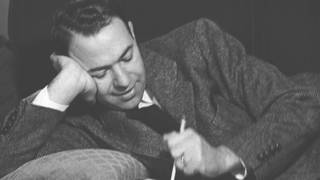
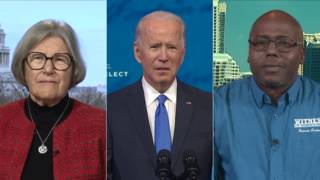
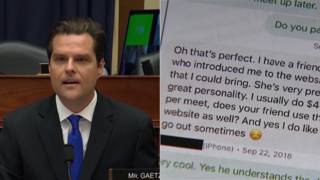
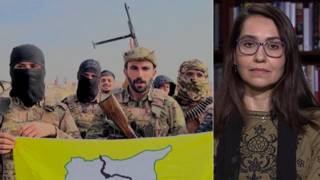






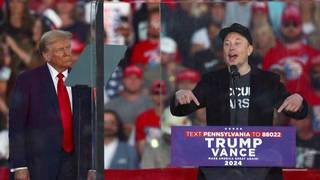
Media Options